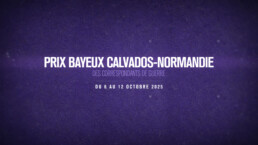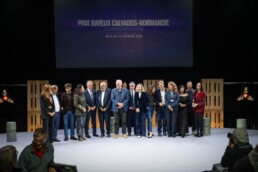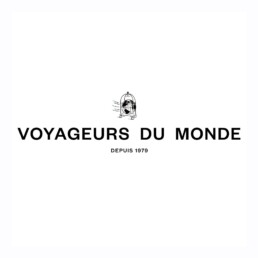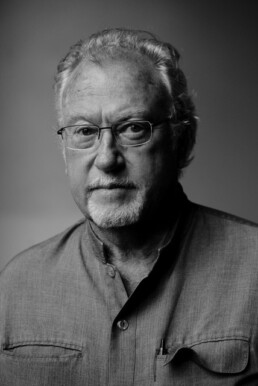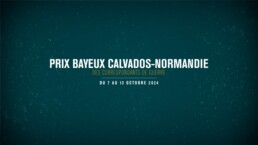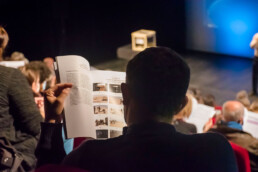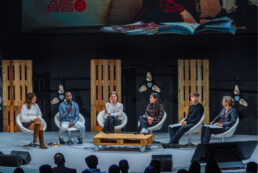32nd edition of the Bayeux Calvados-Normandy Award: results
More than forty war correspondents have gathered in Bayeux on October 10th and 11th to debate and award seven trophies in the following categories: photo, print, radio, television, grand format television, young reporter (print) and video image. Three honorary awards have been attributed: the Regional prize for students and trainees of Normandy (television), the Public’s Choice award (photo) and the Ouest-France – Jean Marin prize (print). Presided by Jon Lee Anderson, the international jury of the 32nd edition of the Bayeux Calvados-Normandy Award for war correspondents has reached its verdict…
“This has definitely been one of the strongest journalistic offerings I have seen since I have come to the Prix Bayeux. We evaluated an incredible array of material that included many examples of real journalistic excellence, and it came from all over the globe. We had vigorous debates which were always stimulating and ultimately rewarding. I am tired, but feel very satisfied by the process we have engaged in, and I trust that the public will agree with our choices.“
Jon Lee Anderon
PHOTO TROPHY – INTERNATIONAL JURY
AWARDED BY NIKON
1st Prize
Saher ALGHORRA
ZUMA PRESS / THE NEW YORK TIMES
Trapped in Gaza: Between Fire and Famine
GAZA
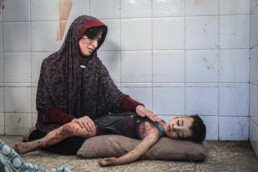
2nd Prize
Ali JADALLAH
ANADOLU AGENCY
Attaques israéliennes sur Gaza
GAZA
3rd Prize
Jehad ALSHRAFI
Associated Press
An Ongoing War in Gaza
GAZA
TELEVISION TROPHY – INTERNATIONAL JURY
AWARDED BY AMNESTY INTERNATIONAL
1st Prize
Julie DUNGELHOEFF
James ANDRÉ
Sofia AMARA
France 24
Les rescapés de l’enfer des geôles de Bachar al-Assad
SYRIA
2nd Prize
Solenn RIOU
Pauline LORMANT
Oleksii SAUCHENKO
TF1
En immersion avec les commandos ukrainiens sur le front
UKRAINE
3rd Prize
Jomana KARADSHEH
Tareq AL HILOU
Mohammed AL SAWALHI
Mick KREVER
Mark BARON
CNN
Ce que quatre heures révèlent sur la vie des enfants à Gaza
GAZA
PHOTO TROPHY – PUBLIC’S CHOICE AWARD
SPONSORED BY ISIGNY SAINTE-MÈRE & NUTRISET GROUP
1st Prize
Ali JADALLAH
ANADOLU AGENCY
Attaques israéliennes sur Gaza
GAZA
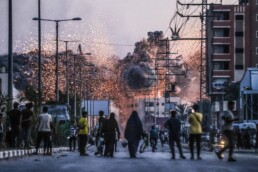
PRINT TROPHY – INTERNATIONAL JURY
AWARDED BY THE DEPARTMENT OF CALVADOS
1st Prize
Wolfgang BAUER
Zeit Magazin
Les oubliés
SUDAN
2nd Prize
Declan WALSH
The New York Times
Le Soudan en feu
SUDAN
3rd Prize
Alexander CLAPP
The Economist
Cocaïne, bananes et enfants sans langue : dans les coulisses du tout dernier narco État du monde
EQUATOR
RADIO TROPHY – INTERNATIONAL JURY
AWARDED BY THE D-DAY LANDING COMMITTEE
1st Prize
Maurine MERCIER
RTS – RTBF
Pokrovsk : deux fleurs dans les ruines
UKRAINE
2nd Prize
Manon CHAPELAIN
RFI
Barrage de Tichrine : le dernier front de Syrie
SYRIA
3rd Prize
Aurélien COLLY
RADIO FRANCE
Syrie : la folie de la tyrannie
SYRIA
YOUNG REPORTER TROPHY (PRINT) – INTERNATIONAL JURY
AWARDED BY CRÉDIT AGRICOLE NORMANDIE
1st Prize
Pierre TERRAZ
For POLITIS, NEUE ZÜRCHER ZEITUNG, GRANDS REPORTAGES
Birmanie : plongée clandestine dans la guerre civile
MYANMAR
GRAND FORMAT TELEVISION TROPHY – INTERNATIONAL JURY
AWARDED BY CAEN MEMORIAL MUSEUM
1st Prize
Agnès NABAT
Marianne GETTI
KRAKEN FILMS for ARTE Reportage
Tigré : viols, l’arme silencieuse
ETHIOPIA
VIDEO IMAGE TROPHY – INTERNATIONAL JURY
AWARDED BY ARTE, FRANCE MÉDIAS MONDE, FRANCE TÉLÉVISIONS
1st Prize
Edward KAPROV
Lila Production for ARTE Reportage
Donbass, entre la vie et la mort
UKRAINE
PRINT TROPHY – OUEST-FRANCE – JEAN MARIN
1st Prize
Declan WALSH
The New York Times
Le Soudan en feu
SUDAN
TELEVISION TROPHY – REGIONAL PRIZE FOR STUDENTS AND TRAINEES OF NORMANDY
1st Prize
Jomana KARADSHEH
Tareq AL HILOU
Mohammed AL SAWALHI
Abeer SALMAN
Mick KREVER
Mark BARON
CNN
Ce que quatre heures révèlent sur la vie des enfants à Gaza
GAZA
Voyageurs du Monde, new partner
Founded 40 years ago and constantly evolving, Voyageurs du Monde designs journeys that respect people, cultures, and the
environment. Convinced that tourism is one tool among others to promote peace, human rights, and the economic development of
the world’s most disadvantaged regions, Voyageurs du Monde is committed to:
- Organizing travel experiences based on genuine encounters, thoughtful exploration, sharing, and the promotion of strong
universal values.
- Supporting specific initiatives such as the Satyagraha House in Johannesburg, South Africa — a guesthouse and museum
dedicated to Gandhi, who lived there and developed his now-universal doctrine of nonviolent resistance.
- Providing ongoing support to various humanitarian aid and human rights organizations, including Unitaid, Human Rights Watch,
and FIDH (International Federation for Human Rights).
- Carrying out social initiatives: through its Philippe Romero Insolite Bâtisseur Foundation, Voyageurs du Monde allocates nearly
2 million euros annually to humanitarian, environmental, and social projects (support for marginalized individuals, aid to
migrants, and the fight against climate change), in partnership with organizations such as SOS Méditerranée and the Refettorio.
The involvement of Voyageurs du Monde alongside the Bayeux Award for War Correspondents is a natural extension of these
commitments.
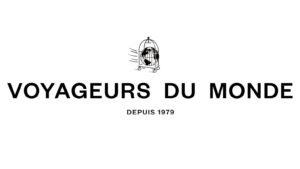
Jon Lee Anderson, a witness of the history of his time
American Jon Lee Anderson, 68, has accepted the invitation from the Prix Bayeux Calvados-Normandie for War Correspondents: this coming October the celebrated war reporter for The New Yorker – and author of the best-selling Che Guevara – will serve as President of the jury. A new experience for a lifelong adventurer…
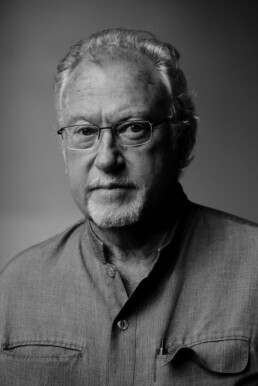
© Valentyn Kuzan
Born into a family that he describes as ‘multicultural’, Jon Lee Anderson’s childhood was atypical. “I grew up in many countries: my father worked for the American foreign services and my mother wrote children’s books. My parents had three children of their own and adopted two more.” It was a cosmopolitan upbringing and an environment that enabled him to become aware of the world around him at an early age.
A world not at peace
His first encounters with war date from his early childhood. “I remember being with my father, aged three, at the DMZ (the boundary line between South and North Korea) and looking across to a North Korean soldier who was on guard. He stood there, staring back at us expressionlessly and without speaking, from a short distance away.” Although he didn’t grasp the idea of conflict, he nonetheless realised that another world existed. “A world that was not at peace.” At about the same time, at his mother’s side, he glimpsed the effects of war on civilian populations. “She had a book about Picasso with a great many photos of the artist. One of them in particular bothered me: the painter was looking at photographs of victims of the Spanish Civil War. His face showed great sadness. I asked her again and again to try to understand: Why? Why was this man so sad? Why were these people dead? And how could anyone even imagine committing these horrors? This was when I came to understand that there was something called war, in which men would take up arms and kill.” A few years later, when the family had come back to live in the United States for the first time, the young Jon Lee marched with his parents against Nixon and the Vietnam war. It was 1968 and the year was also marked by the assassinations of Martin Luther King and Robert Francis Kennedy. “So my political awakening comes from this sense of injustice in my own country.” As did his thirst to understand. To understand war, understand its origins and its workings. “It was the beginning, I suppose, of a kind of moral quest.”
A witness of the history of his time
As an avid reader of all kinds of biographies (and especially of contemporary explorers) Jon Lee became interested in adventure and exploration. Inspired and encouraged by his mother he soon developed an ambition to be a writer too. But not any kind of writer. “I wanted to be a witness of the history of my time.” Brought up on travel from his early childhood, aware of human conditions and naturally audacious, the blithe teenager began his quest. At first he was accompanied by contacts of his parents – he spent a week in rural Taiwan at nine years of age, hunting and fishing with one of his father’s employees, spent times in a ranch in Australia’s outback at 11 and 12, and at 13, joined an uncle and aunt who were geologists, living in Liberia – but soon took off on his own, travelling in the bush there and in East Africa. The continent of Africa was still in the throes of anti-colonial struggles, and he read the work of war correspondents, became more and more interested in politics and got a feel for journalism. Writer or war reporter? “The two had fused.” From Africa, Jon Lee soon went to South America, to Peru – where he got his first job reporting – and from there Central America and Nicaragua, where the Sandinistas were fighting against the Somoza dictatorship. As a young journalist he spent the next few years covering the various civil wars that were erupting in the region: Nicaragua, Guatemala, El Salvador, Grenada, Surinam…
He got to know and spend time with the guerrillas and some of their insurgent leaders, and to see how they lived and operated. “From that moment on, I began to understand war.” To understand but also to experience it. “I was shot at, I saw my first dead people, I felt the injustice, I was ambushed… Everything that can happen when you’re in the midst of a guerrilla war.”
A first book to understand the psychology of violence
Particularly interested in the condition of people who spend their lives at war and frustrated by not being able to dwell on this aspect of conflict in his articles, Jon Lee decided to write a book on the world of insurrection. Guerrillas: journeys in the insurgent world was published in 1992 after four years spent with insurgent groups in different parts of the world. “I returned to El Salvador, Palestine – particularly to Gaza – and I went to Afghanistan, Western Sahara and Burma. I spent time with fighters who were difficult and sometimes hostile. A few were psychopaths. Not everyone was open to outsiders. But most of them were people just like us, who, for various reasons had chosen to live their lives in resistance to what they saw as unfair or corrupt systems of government. I was trying to document their motivations, the way they lived, the ways they were creating a new society. I wanted to find answers to my questions and understand the psychology of violence. It was really the culmination of my lifelong quest to understand war.” He went on from this book to write a biography, of Che Guevara, which was a best-seller. “He was the incarnation, the personification of all these people I had been interested in.” The work was a kind of detective story. “And it was an opportunity to do something new and different.” He spent five years on the book before beginning what he describes as the “second part of his career ”.
Understanding war
A second part that began on 11 September 2001. “I felt I had to go back to Afghanistan because I knew the country.” Afghanistan, Iraq, Libya, Somalia, Liberia, Mali, Lebanon… From one country to another, Jon Lee found answers to his questions. “Instead of becoming a naturalist – which I’d hoped to be as a child – I became someone who understood war. That doesn’t mean I approve of it, but I understand it. Going to war is the most terrible thing a man can do. And yet as terrible as it is, sometimes it becomes the only way for a society to survive. This is a reality of the story of humanity that has been going on for ever.” Jon Lee sometimes feels powerless in the face of events. “I can see conflicts develop and I know when they have reached the point of no return: it’s a terrible feeling to know that, at that moment, there is no other outcome but war.” Current events also mean the situation in his own country. As an American who has spent much of his life living outside of the United States, he has an outsider’s view of the current political situation: “I see the country as foreigners see it. But because of my nationality I feel I have to decode this “Trumpification” of American politics and try to help illuminate what’s going on and what we need to be aware of. ”
Jon Lee Anderson will be sharing his viewpoint on the United States and the world with his peers next October in Bayeux. A regular at the Prix who has already participated in the work of the jury, this time he will assume the mantle of President. In this he will succeed Clarissa Ward as well as two of his close colleagues and friends: Ed Vulliamy (2020) and Thomas Dworzak (2022).
The curious child, the teenager who was afraid of nothing (except mobs), the man who wanted to be a witness of the history of his time will have to decode and dissect the best in conflict journalism. “A tough task but a great honour.”
« How can you kill? How can you do that? As a boy I couldn’t understand how this could be. What also interested me was how societies dress up their wars with legal and even moral justifications. War is the most horrifying thing man does, and yet we have our bloodlettings and then often go back to being peaceful “civilised nations” again. This contradiction, this moral contradiction was at the root of my interest in war. »
SOME DATES
1986 Inside the League (with Scott Anderson)
1988 War Zones: Voices from the World’s Killing Grounds (with Scott Anderson)
1992 Guerrillas: journeys in the insurgent world, Times Books
1997 Che Guevara: a revolutionary life, Grove Press, New York Times Notable book of the year
1998Began working for The New Yorker, covering Syria, Lebanon, Libya, Iraq, Afghanistan, Angola, Somalia, Sudan, Mali, Liberia and Latin America
2003 The Lion’s Grave: dispatches from Afghanistan, Grove Press
2004 The Fall of Baghdad, Penguin Press
2020 Che, une vie révolutionnaire, Vuibert (graphic adaptation)
August 2025 To Lose a War: The Fall and Rise of the Taliban, Penguin Press
Nikon Meetings
For several years now, Nikon has been committed to the Bayeux Award, demonstrating its fervent support for photojournalism and its lasting commitment to defending the values of truth and freedom of expression. Once again this year, this commitment is reflected in the renewal of its partnership with the Bayeux Award for War Correspondents, enabling it to continue to support and celebrate the work of photojournalists who capture poignant and crucial stories around the world. As well as sponsoring the Photo trophy, the brand will once again be supporting the outdoor exhibition in the streets of Bayeux, and will once again be hosting the Rencontres Nikon, a genuine opportunity for professionals and the public to meet and share ideas.

Visual
The 2025 visual uses a photo from the 2024 winning report. This photograph taken by Mahmud Hams from AFP was part of his report shot between October 2023 and January 2024 inside Gaza, in the hell of war.
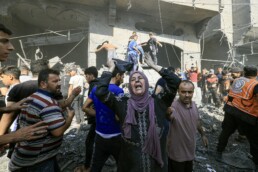
Caption: Palestinian woman reacts as others rush to look for victims in the rubble of a building following an Israeli strike in Khan Yunis in the southern Gaza Strip on October 17, 2023
Mahmud Hams graduated from the Islamic University of Gaza with a degree in journalism and information. He joined AFP in 2003, covering daily news in the Gaza Strip and occasionally in Libya and Egypt. He has won numerous international awards.
He has already been awarded the Bayeux Prize for War Correspondents twice: in 2007 for a photo of young Palestinians fleeing an Israeli army bombardment; then in 2018 for his work on the protest movement known as the ‘Great March of Return’, which mobilised thousands of Palestinians along the border.
© Bayeux Award photo 2024 – Mahmud Hams / AFP
An exceptional occasion for schoolchildren
© UNHCR / Clémence Enjelvin
For the 32nd edition, the HCR - the United Nations Agency for refugees - and Ouest-France newspaper are offering an exceptional educational event for middle and high school students in Normandy: “the HCR-Ouest-France Encounters”.
Partners of the Bayeux Award, the HCR and Ouest-France will be addressing school students and inviting them to meet refugees who will talk about their experiences of exile and inclusion in France. HCR experts will also be on hand to explain the importance of international protection for those fleeing war and persecution. In this age of instantaneous information, the HCR and Ouest-France aim to give young people a different understanding of the position of refugees in France and around the world.
31st edition of the Bayeux Calvados-Normandy Award: results
More than forty war correspondents have gathered in Bayeux on October 11th and 12th to debate and award seven trophies in the following categories: photo, print, radio, television, grand format television, young reporter (photo) and video image. Three honorary awards have been attributed: the Regional prize for students and trainees of Normandy (television), the Public’s Choice award (photo) and the Ouest-France – Jean Marin prize (print). Presided by Clarissa Ward, the international jury of the 31st edition of the Bayeux Calvados-Normandy Award for war correspondents has reached its verdict…
“I was so impressed by the work that we were judging. So beautiful, bold, brave and vital… I wish we could award everyone. We had very important conversations in this room. The discussions and debates were also very illuminating for me: I learnt a lot from the perspectives and the different visions of my TV, radio, photo or print colleagues. It made me very proud to be a journalist. “
Clarissa Ward
PHOTO TROPHY – INTERNATIONAL JURY
AWARDED BY NIKON
1st Prize
Mahmud HAMS
AFP
Gaza, in the hell of war
GAZA
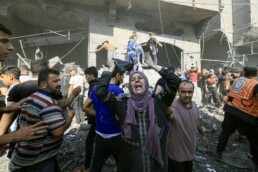
2nd Prize
Kostiantyn LIBEROV
LIBKOS
La guerre en Ukraine. Douleur, désespoir et espoir
UKRAINE
3rd Prize
Ali JADALLAH
ANADOLU AGENCY
Attaques israéliennes sur la bande de Gaza
GAZA
TELEVISION TROPHY – INTERNATIONAL JURY
AWARDED BY AMNESTY INTERNATIONAL
1st Prize
Mohammed ABU SAFIA
John IRVINE
ITV NEWS
Le drapeau blanc
GAZA
2nd Prize
Nicolas COADOU
David COULOUME
Manuella BRAUN
BFM TV
Kharkiv, la mort en face
UKRAINE
3rd Prize
Ahmad ABU AJWA
John SPARKS
SKY NEWS
Les dernières heures de la famille Khattab
GAZA
PHOTO TROPHY – PUBLIC’S CHOICE AWARD
SPONSORED BY GROUPE NUTRISET – ISIGNY SAINTE-MÈRE
1st Prize
Kostiantyn LIBEROV
LIBKOS
La guerre en Ukraine. Douleur, désespoir et espoir
UKRAINE
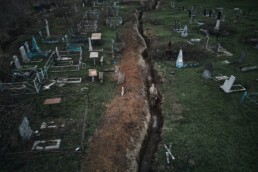
PRINT TROPHY – INTERNATIONAL JURY
AWARDED BY THE DEPARTMENT OF CALVADOS
1st Prize
Rami ABOU JAMOUS
ORIENT XXI
Journal de Gaza
GAZA
2nd Prize
Lily HYDE
ATAVIST MAGAZINE
2000 miles de chez moi
UKRAINE
3rd Prize
Matthieu AIKINS
THE NEW YORK TIMES
America’s Monster
AFGHANISTAN
RADIO TROPHY – INTERNATIONAL JURY
AWARDED BY THE D-DAY LANDING COMMITTEE
1st Prize
Andrew HARDING
BBC NEWS
L’histoire de Sara
FRANCE
2nd Prize
Omar OUAHMANE
RADIO FRANCE
Haïti, de la perle des Antilles à l’enfer des gangs
HAITI
3rd Prize
Sami BOUKHELIFA
RFI
Israël – Palestine : deux enfants fauchés par la guerre
ISRAEL – PALESTINIAN TERRITORIES
YOUNG REPORTER TROPHY (PHOTO) – INTERNATIONAL JURY
AWARDED BY CRÉDIT AGRICOLE NORMANDIE
1st Prize
Saher ALGHORRA
Freelance for ASSOCIATED PRESS, ZUMA PRESS
Gaza strip: the impact of the war on civilians
GAZA
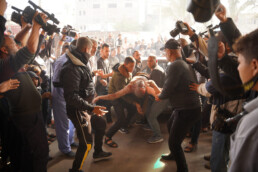
2nd Prize
Loay AYYOUB
Freelance
The Israeli war on Gaza and its impact on civilians
GAZA
GRAND FORMAT TELEVISION TROPHY – INTERNATIONAL JURY
AWARDED BY CAEN MEMORIAL MUSEUM
1st Prize
Rami ABOU JAMOUS
Fabrice BABIN
Bertrand SEGUIER
BFM TV
Gaza, fuir l’enfer
GAZA
2nd Prize
Charles EMPTAZ
Olivier JOBARD
ARTE REPORTAGE
Haïti : les mots contre les balles
HAITI
VIDEO IMAGE TROPHY – INTERNATIONAL JURY
AWARDED BY ARTE, FRANCE 24, FRANCE TÉLÉVISIONS
1st Prize
Marc DE CHALVRON
Florian LE MOAL
Ludovic LAVIELLE
Laroslav OLIINYK
FRANCE 2
Soldats à bout de souffle
UKRAINE
PRINT TROPHY – OUEST-FRANCE – JEAN MARIN
1st Prize
Rami ABOU JAMOUS
ORIENT XXI
Journal de Gaza
GAZA
TELEVISION TROPHY – REGIONAL PRIZE FOR STUDENTS AND TRAINEES OF NORMANDY
1st Prize
Nicolas COADOU
David COULOUME
Manuella BRAUN
BFM TV
Kharkiv, la mort en face
UKRAINE
Booking People’s Choice Award
On Saturday October 12th, the public will select its prize-winner in the photo category.
This prize will be handed during the award ceremony.
10 AM: People’s Choice Award sponsored by Groupe Nutriset - Isigny Sainte-Mère.
11 AM: Discussion with photojournalist Diana Zeyneb Alhindawi
Saturday 12 October, 10 am
Halle ô Grains
66, rue Saint-Jean
Doors open at 9.30 am
Booking required here
If you are unable to attend at the last minute, please contact us on +33 2 31 51 60 47
Booking Award ceremony
The ceremony hosted by Nicolas Poincaré will be the opportunity to review the major events of this past year. Documentaries made especially for this event will be shown throughout the evening. The public will also be able to discover the award-winning reports, in the presence of the jury and a great number of journalists.
SATURDAY 12 OCTOBER, 6.30 pm
Pavillon Prix Bayeux-Calvados
Place Gauquelin Despallières
Doors open at 5 pm
Booking required
If you are unable to attend at the last minute, please contact us on +33 2 31 51 60 47
Visual
The 2024 visual uses a photo from the 2023 winning report. This photograph taken by Siegfried Modola was part of his report shot between September 2022 and April 2023 inside Myanmar’s armed uprising.
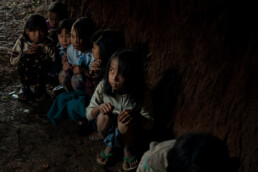
Caption: Children hide in their school bomb shelter during an emergency drill in case of mortar shelling by government forces based a few kilometers from their town, on October 24, 2022, Kayah (Karenni) State, eastern Myanmar (Burma). The children do regular emergency drills in case of an attack.
Their town has been bombed three times in the last year. According to the United Nations, thousands of people have been killed, some 1.4 million have been displaced since the coup, and one-third of the country’s population needs humanitarian aid.
Siegfried Modola is a Kenya-raised independent Italian/British photojournalist and documentary photographer focusing on social, humanitarian, and geopolitical events. Modola’s career as a photojournalist took off when he started working for the Reuters news agency in Nairobi in 2010. Since then he has reported in over a dozen countries in Africa and has traversed the globe, venturing into diverse and often challenging environments to shed light on untold stories. He has worked in Europe, the Middle East, Asia, and South America: From the post-coup d’etat conflict in Myanmar to the civil war in South Sudan and the conflict in Somalia to the chronic insecurity gripping the Central African Republic and Nigeria to the humanitarian crisis in the Democratic Republic of the Congo.
He has covered the Venezuelan refugee crisis on its borders, the depopulation of the Italian countryside, immigration issues in Italy/France, the 2014 Israel-Gaza war, the Syrian refugee crisis in northern Iraq in 2016 and the exodus of Rohingya refugees in Bangladesh in 2017, 2018 and 2019. His photographs have appeared in some of the most prominent publications worldwide, raising awareness among viewers.
© Bayeux Award photo 2023 – Siegfried Modola
Call for applications
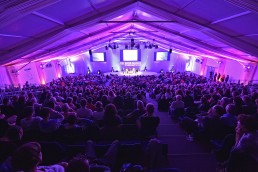
The Bayeux Calvados-Normandy award for war correspondents rewards reports about a conflict situation or its impact on civilians, or news stories involving the defence of freedom and democracy.
The report must have been made between 1 June 2023 and 31 May 2024. A €7,000 prize is awarded in each category.
The reports must be submitted to the following address by June 6th 2024: info@prixbayeux.org with a link to download the entry
The categories of media represented are: radio – photography – television (short and long formats) – written press and the young reporter prize (photo this year)
TEN PRIZES ARE AWARDED
Seven prizes awarded by the international jury
- Written Press Prize
sponsored by the Calvados Department – €7000 - Television Prize
sponsored by Amnesty International – €7000 - Radio Prize
sponsored by the D-Day Landing Committee – €7000 - Photo Prize
sponsored by Nikon – €7000 - Grand format Television Prize
sponsored by Caen Memorial museum – €7000 - Young reporter Prize
sponsored by Crédit Agricole Normandie – €3000 - Video image Prize
sponsored by Arte, France 24 and France Télévisions – €3000
Three special prizes
- The Ouest-France – Jean Marin Prize (written press)
– €4000 - The Public Prize (photo)
sponsored by the city of Bayeux
– €3000 - The Normandy Region secondary School Students’ Prize (television)
– €3000
REGULATIONS
Reports published or broadcast only on digital media can apply in the same way as others (regardless of whether the report has been published in photo category).
– The Young Reporter’s Award: in 20234 the category is photo. Since there is a different category according to the years, the presented story must have been realized between 1 June 2022 and 31 May 2024.
– Written press category: the application must be made up of an article or a series of 1 to 3 articles on the same subject.
– Television category: the length of the report must be between 1 minute 30 seconds and 6 minutes. The report submitted must be identical to the broadcast piece.
– Grand format television category: the length of the report must be between 6 and 30 minutes. The report submitted must be identical to the broadcast piece.
– Radio category: the length of the report must be between 1 minute and 6 minutes. The report submitted must be identical to the broadcast piece.
– Photo category: The application comprises a report made up of 8 to 15 photos.
Clarissa Ward, President of the Jury for the 31st Prix Bayeux
The Anglo-American journalist Clarissa Ward has accepted the invitation from the Prix Bayeux-Calvados-Normandie for War Correspondents: next October the CNN star journalist will don the mantle of President of the international jury for the 31st edition of the event. At the age of 44, it is an“honour”and a “big responsibility” for one of the youngest Presidents in the history of the Prix Bayeux.
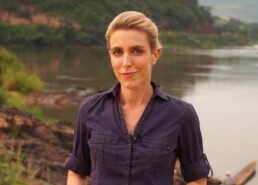
© crédit
Last December Clarissa Ward became the first and only Western journalist to enter Gaza with neither permission nor escort from the Israeli army. A coup which served to confirm once more, as if it were needed, the aura and reputation of this multi-lingual journalist who had already received nine Emmys, three DuPont awards and two Peabody awards.
Birth of a vocation
For Clarissa Ward it all started in 2001. On 11 September to be precise. As she began her final year at Yale University, the young student of French, Italian and Russian literature – who had no ambitions of a career in journalism at the time – was deeply affected by the attack on the World Trade Centre. She felt it as “a calling” even more than a shock, at the deepest level of her being. “I wanted to better understand how this had happened, and it seemed to me that some of it at least was born out of miscommunication and misunderstanding between different worlds. I became very fixated on this idea of trying to understand where this had come from, and I felt that I wanted to be a kind of translator between these two different worlds.” Clarissa took heed of her vocation, finished her studies, obtained her degree in comparative literature and began her career as a reporter.
Meteoric rise
Having begun as an assistant on the night-time edition of Fox News, Clarissa quickly moved to ABC and then CBS News. Working for these major American networks she was based first in Moscow, Beijing and then London and travelled to many war zones. Among them Syria provided the opportunity for her earliest coup and first international recognition: while there she did an interview with two Western fighters who had gone there to wage jihad, and became the only Western journalist to have interviewed an American jihadi. In 2015 she joined CNN and three years later succeeded Christiane Amanpour as Chief International Correspondent. In 2021 she was in Afghanistan when the Taliban regained power. In 2022 she covered the Russian invasion of Ukraine. Each time her reports on families in distress struck a chord with public opinion. Driven by “a fundamental curiosity about human nature” Clarissa Ward continued to pursue the mission she had set for herself more than twenty years earlier: “to shine a light on the experience of ordinary civilians living through extraordinary moments”.
Sensitivity
And Clarissa encountered many ordinary citizens. Very many. Enormous numbers of them. So many that she decided to write a book about them. On All Fronts: the Education of a Journalist, published in 2020, enabled her to share the “kindness, courage, resilience, altruism, bravery: you see extraordinary moments of kindness and selflessness that don’t generally make the front page of the papers, but need to be told”. Clarissa describes the book as a “memoir” that she also wrote for her children. As the mother of three young boys – “a second full-time job!” – the journalist firmly believes that her work will contribute to making her children “better citizens, better humans, open to the world and the way it works”. She explains that they in turn “have made her a better journalist, with a lot more compassion, viewing stories in a different way”. Having seen the worst of what humanity is capable of, she retains a degree of optimism. “I’ve seen the worst of humanity but also the best.”
A new role
Accustomed to ”going where the news takes her” Clarissa Ward will make an exception next October to spend a few days in Bayeux. A unique time and space that she sees as “the opportunity to immerse myself in some of the best journalism out there”. She feels honoured to take part in the deliberations for “one of the most prestigious and well-respected awards for conflict journalism” and is aware of her responsibilities: “Moderating the conversations around how we judge journalism, deconstructing stories, is a challenging process. What are the parameters for judging what is the best journalism? Is it about bravery? Is it about the story-telling? Is it about newsworthiness? Is it about impact? It’s not often that we have the opportunity to dig deep into what constitutes great journalism. I’m sure there’ll be some interesting debates: journalists love to debate!”
Following on from Christiane Amanpour
In addition to their origins (both were born in London) and their positions at CNN, Clarissa Ward and Christiane Amanpour will soon have another thing in common: having been President of the jury at the Prix Bayeux. In 2018 this small town in Calvados welcomed the American news channel’s star of current affairs. In 2024 it will do so again with Clarissa Ward.
Clarissa Ward – Some dates
1980 — Born in London
2002 — Graduated Yale University with BA in comparative literature
2002 — CNN Moscow internship
2003 — FOX News Overnight Assignment Desk
2005 — Moved to Beirut and started working as a freelance producer in Baghdad / Beirut / Middle East
2007 — ABC News Moscow Correspondent
2009 — ABC News Beijing Correspondent
2011 — CBS News Correspondent based out of London, mostly covering the Syrian civil war
2011 — Peabody Award for her undercover work during the Syrian uprising
2013 — DuPont Columbia Award for her work in Syria for CBS News
2015 — Murrow Award for International Reporting, Washington State University
2015 — Joined CNN
2016 — Peabody Award for the CNN reports: ISIS in Iraq and Syria, Undercover in Syria, Battle for Mosul
2016 — David Kaplan Award for Undercover in Syria
2016 — Excellence in International Reporting Award from the International Center for Journalists
2018 — Appointed CNN Chief International Correspondent
2019 — Reporter of the year for Alliance of Women in Media (AWM)
2020 — “On All Fronts: the Education of a Journalist” is published
2020 — DuPont Award with Nic Robertson for CNN’s reporting on the assassination of Jamal Khashoggi
2023 — Emmy and DuPont Awards for Ukraine coverage
An exceptional occasion for school children
For the 31st edition, the HCR - the United Nations Agency for refugees - and Ouest-France newspaper are offering an exceptional educational event for middle and high school students in Normandy: “the HCR-Ouest-France Encounters”.
Partners of the Bayeux award, the HCR and Ouest-France will be addressing school students and inviting them to meet refugees who will talk about their experiences of exile and the importance of international protection for those fleeing from war and persecution. In this age of instantaneous information, the HCR and Ouest-France aim to give young people a different understanding of the position of refugees in France and around the world.

